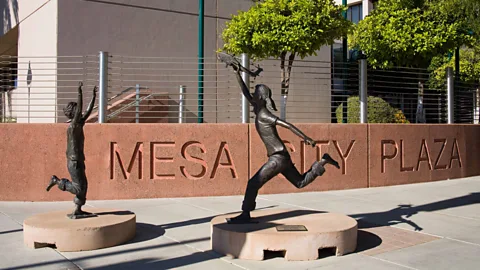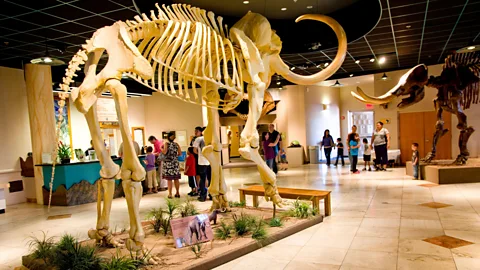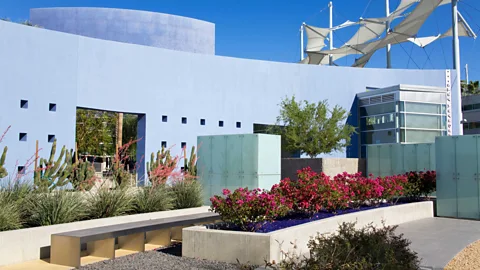Mesa: The US' first autism-friendly city
 Brent_1/Getty Images
Brent_1/Getty ImagesHolidays can be stressful for neurodiverse people, but Mesa, Arizona, is becoming more inclusive so that everyone can enjoy the benefits of travel – not just the neurotypical.
On a family holiday in 2018, Marc Garcia was shocked at the strange looks and lack of patience that hospitality staff had for his autistic son. As the CEO and president of tourism bureau Visit Mesa in south-central Arizona, he vowed on his return to ensure neurodiverse travellers who visited his city would have a better experience on their trip than his family had on theirs.
In fact, travel can be so stressful for neurodiverse people that 87% of autistic families don't take vacations, according to a survey by Autism Travel, an arm of the International Board of Credentialing and Continuing Education Standards (IBCCES). The sensory overload involved in travel – including loud noises, dietary changes and a disruption in routine – can cause discomfort and outbursts if not compassionately managed and addressed. But cities like Mesa are finally putting the training and accessibility tools in place so that everyone can enjoy the benefits of travel – not just the neurotypical.
As a starting point, Garcia worked to get the entire tourism bureau trained and certified by the IBCCES, which works to provide cognitive disorder training and certification to professionals so they can be better equipped to interact with neurodiverse people across different settings. For businesses like hotels, restaurants and attractions, this means public-facing staff are trained to understand what autism is, how to empathise with how autistic individuals experience the world and potential common sensitivities, and how to communicate more effectively with them.
In 2020, one in 36 children were diagnosed with autism in the US, according to the Centers for Disease Control, and the World Health Organization estimates one in 100 children have autism worldwide, a number that keeps increasing year on year, making it the fastest-growing developmental disorder in the world. Along with sharing statistics and education on autism, the IBCCES training also provides practical guidance on ways to better accommodate neurodiverse individuals.
 Richard Cummins/Alamy
Richard Cummins/Alamy"For example, some people learn more on a visual level, so we can accommodate them through our destination more visually through brochures, pamphlets, and maps," said Zoey Shircel of Visit Mesa, and a certified autism travel professional. She also says that it taught her that some people might need a bit more time to absorb information, like where an attraction is or what there is to do.
The training opened her eyes to how many travellers might struggle with unseen challenges. "Before I got certified I didn't notice people who might have a hidden disability," she said. "But after learning about the certification, more people are open to talk about what they might need or what extra help we can provide, without being scared or embarrassed."
Visit Mesa was the first city in the US to adopt the Hidden Disabilities Sunflower programme in 2021, first introduced in the UK, with the tourism office and other attractions providing free sunflower-themed lanyards and bracelets to visitors. The sunny symbol alerts hospitality employees and other informed members of the community that this person or family might need some extra assistance or patience navigating a destination.
 Dave G Houser/Alamy
Dave G Houser/AlamyAfter seeing the success with certification in the tourism bureau, the entire city of Mesa understood the value of becoming more inclusive and set to work on getting the required 80% of public-facing employees – including parks and recreation employees, police and public safety officers and firefighters – trained to become an official Certified Autism Center (CAC). In November 2019, the city became the first Autism-Certified City in the world, and other tourism bureaus and cities have started to follow suit.
Autism-Friendly Destinations
Many other tourism bureaus and destinations have or are currently working towards being Certified Autism Centres. Here's a few that have or are currently working towards certification:
But the certification is far from a one-and-done set of requirements. The programme requires annual training and re-certification to ensure employees stay up to date on the latest neuro-inclusive practices and tools.
In Mesa, more than 60 different businesses and organisations have completed the training to become CACs. Visitors can see the result of this in places like the Arizona Museum of Natural History which provides a helpful guide of the sensory impact of different galleries, which can be accessed either online or viewed in each gallery entrance. For example, the guide ranks Dinosaur Hall a five out of 10 for sound sensory stimulation, a three for sight, a two for touch and only a one for smell and taste. Guides like this help families plan the right routes through the museum, as well as find designated quiet areas if overstimulation becomes an issue.
"Museums are special places where people come to learn, relax and make memories with friends and family," said Alison Stoltman, deputy director at the museum. "However, highly stimulating atmospheres can be a barrier to some, limiting accessibility."
To help, the museum recently held its first "sensory gentle" event, where the museum opened early with limited tickets and more stimulating experiences were toned down. "We had great feedback with numerous accounts from families that this gentle experience opened up the possibility for their family to visit," Stoltman said.
 Richard Cummins/Alamy
Richard Cummins/AlamyFor Jennifer Hedgepeth, event services coordinator at the Mesa Arts Center, the training she received was particularly personal since she has a child on the autism spectrum. "A lot of the training aspects were things I already knew, but it was nice to learn about some of those things more in depth," she said. "It's also really neat to know all of my co-workers and the City of Mesa receive the same training."
Though the shows performed at the Mesa Arts Center can vary in sensory stimulation, the Center provides accommodations like weighted blankets and noise-cancelling headphones that can help during a performance, as well as low-sensory quiet spaces in case someone needs some time out.
"If you travel to a foreign country and you don't speak the language, knowing that you have access to someone like an interpreter can help you get through your experience in a better way," said Hedgepeth. "This is really on that same level. If people are coming to your space, they should feel they can do it comfortably and safely."
Mesa is one of the country's biggest spring training centres for Major League Baseball, and a number of baseball teams and their stadiums in Mesa have also become certified. Because of its outdoor environment, reliable pace and trackable statistics, baseball can offer an inviting pastime for those on the spectrum – but stadiums and live games can still sometimes be overly stimulating. To advocate for these fans, the Oakland A's became the first team to become CAC certified in 2020 by training their staff at Hohokam Stadium, the team's spring home in Mesa, where fans can watch games from late February to late March before the start of the regular season.
 Ron and Patty Thomas/Getty Images
Ron and Patty Thomas/Getty ImagesMesa also serves as a gateway to the outdoors, as it neighbours the nearby Tonto National Forest. Within city limits, the Mesa Parks & Recreation District (also a certified CAC) provides a number of accessible outdoor activities, from "low-stakes" camping (where rangers provide a tent and teach camping skills for an easy overnight stay), to scorpion walks, fishing training and a campfire s'mores-making workshop.
To provide a way to interact with autistic-friendly attractions and restaurants throughout the city, Visit Mesa has put together the family-friendly Autism GeoTour, which lets visitors uncover hidden geocaches in CAC locations via the Geocaching app. If visitors unlock five or more on the tour, they can return to the Mesa Visitor Center for a special prize.
Even though it's made huge strides in accessibility, Mesa isn't ready to slow down anytime soon, setting a goal to become the most accessible city in the country. To that end, Mesa recently partnered with Aira, an on-demand visual interpretation service for those who are blind or low vision. The app lets visitors access a trained agent who can help with trip planning, reading menus and other services. In 2023, Mesa joined up with Wheel the World, a website that maps detailed accessibility information of destinations with both photos and measurements (for example, seeing if a hotel has ramps in its entrance spaces), so disabled visitors can more easily plan their trip and find hotels most suitable for their needs.
"If you have the information beforehand, it makes travelling just a little less stressful," said Shircel. She hopes that every city in the world eventually follows Mesa's achievable example. That way, travellers of all types can more fully enjoy any destination, and enrich cross-cultural conversation in new, neuro-inclusive ways.
---
If you liked this story, sign up for the weekly bbc.com features newsletter called "The Essential List". A handpicked selection of stories from BBC Future, Culture, Worklife and Travel, delivered to your inbox every Friday.
